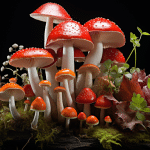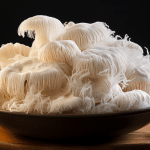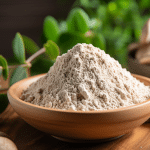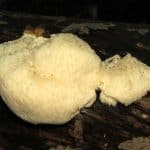Mushroom enthusiasts often find themselves navigating a complex landscape of dietary supplements, seeking those that offer the most health benefits. With an array of options on the market, it becomes crucial to discern which mushroom supplements are worth considering. They aim for products that not only support overall wellness but also align with their health objectives. This quest involves understanding the properties and potential advantages of various fungi, from boosting immunity to enhancing cognitive function. By focusing on credible sources and scientific evidence, they can make informed decisions about incorporating these natural remedies into their regimen. It’s worth taking apart which mushroom supplements can i take which ones aren’t, the facts, the pros. To make an informed decision!
List of Which Mushroom Supplements You Can I Take
In recent years, mushroom supplements have gained widespread attention due to their potential health benefits. From immune support to stress relief, these natural wonders offer a range of benefits. Let’s break down some popular mushroom supplements and the pros and cons associated with them.
Reishi Mushrooms
Reishi mushrooms have been used medicinally in Asia for centuries. They are believed to promote longevity and improve overall health. Reishi mushrooms are thought to boost the immune system, help protect against cancer and heart disease, and improve symptoms of asthma and allergies.
Pros:
- Reishi mushrooms are believed to enhance immune function through their effect on white blood cells, which can help fight infections and cancer;
- They are often used as an adaptogen to help the body cope with stress and reduce fatigue;
- Some studies suggest that Reishi mushrooms can improve blood circulation and reduce both blood pressure and cholesterol, potentially benefiting heart health;
- Reishi contains antioxidants that combat free radicals, potentially reducing the risk of chronic diseases and promoting longevity.
Cons:
- Some individuals may experience digestive discomfort, such as nausea or gastrointestinal upset, when consuming Reishi mushrooms;
- Although rare, allergic reactions can occur, manifesting as skin rashes or respiratory discomfort;
- Reishi mushrooms might interact with certain medications, including those for blood pressure or blood clotting, so consultation with a healthcare provider is advised.
Reishi mushrooms offer a range of health benefits, particularly in supporting the immune system, enhancing stress resilience, and potentially improving heart health. While they are generally safe for most people, it’s important to be mindful of possible digestive discomfort, allergic reactions, and interactions with medications. Consulting with a healthcare provider before adding Reishi mushrooms to your regimen is a prudent step.
Little fact. Reishi mushrooms are revered in Eastern medicine and culture not only for their beneficial properties, but also as a symbolic representation of prosperity and longevity.
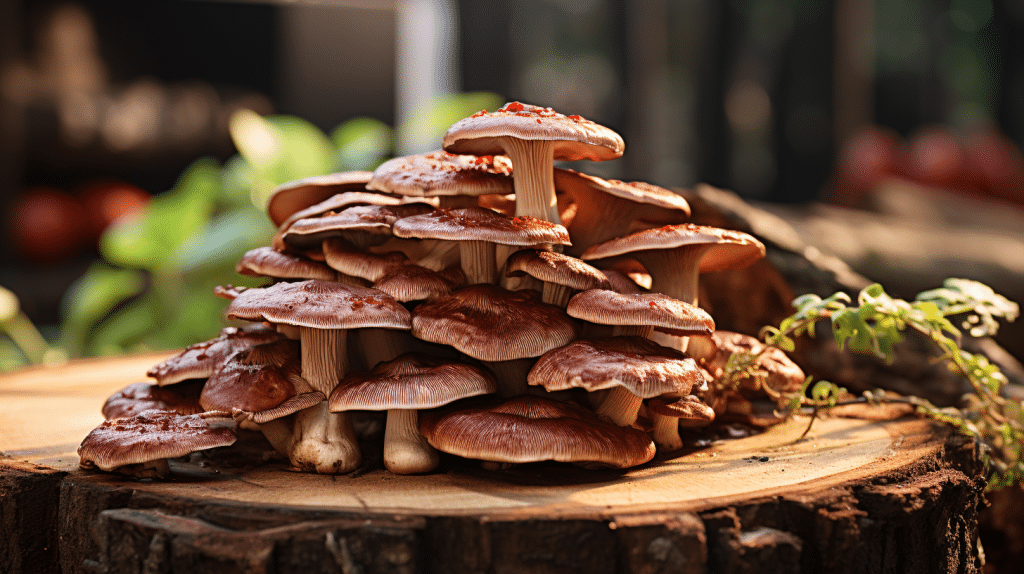
Lion’s Mane Mushrooms
Lion’s Mane mushrooms (Hericium erinaceus) are distinguished by their unique, shaggy appearance that resembles a lion’s mane. These mushrooms are celebrated for their cognitive and neurological health benefits.
Pros:
- Lion’s Mane mushrooms are reputed for their ability to support brain health, potentially improving memory, focus, and cognitive function due to compounds that stimulate the growth of brain cells;
- They may offer neuroprotective benefits, potentially aiding in the prevention of neurological diseases such as Alzheimer’s and Parkinson’s by promoting the production of nerve growth factors;
- Some studies suggest that Lion’s Mane can have a positive impact on mood, reducing symptoms of anxiety and depression;
- Like many medicinal mushrooms, Lion’s Mane is believed to enhance the immune system, providing a general boost to the body’s ability to fight off illness.
Cons:
- A small percentage of people might experience digestive issues, such as bloating or discomfort, particularly when consumed in large quantities;
- As with any fungus, there is a risk of allergic reactions, which could range from mild to severe, including difficulty breathing for those with severe allergies;
- While promising, the research on Lion’s Mane mushrooms is still in the early stages, and more comprehensive studies are needed to fully understand their benefits and potential side effects.
Lion’s Mane mushrooms offer intriguing health benefits, especially concerning cognitive enhancement and neuroprotection. They are a natural option for those looking to support brain health, mood, and the immune system. However, individuals should start with small doses to monitor for any digestive sensitivity or allergic reactions, and the current body of research, while promising, calls for further investigation.
Little fact. Lion’s Mane mushrooms have been used in traditional Chinese medicine for centuries, not only as a health supplement but also as a gourmet ingredient in culinary dishes, valued for their seafood-like taste when cooked.
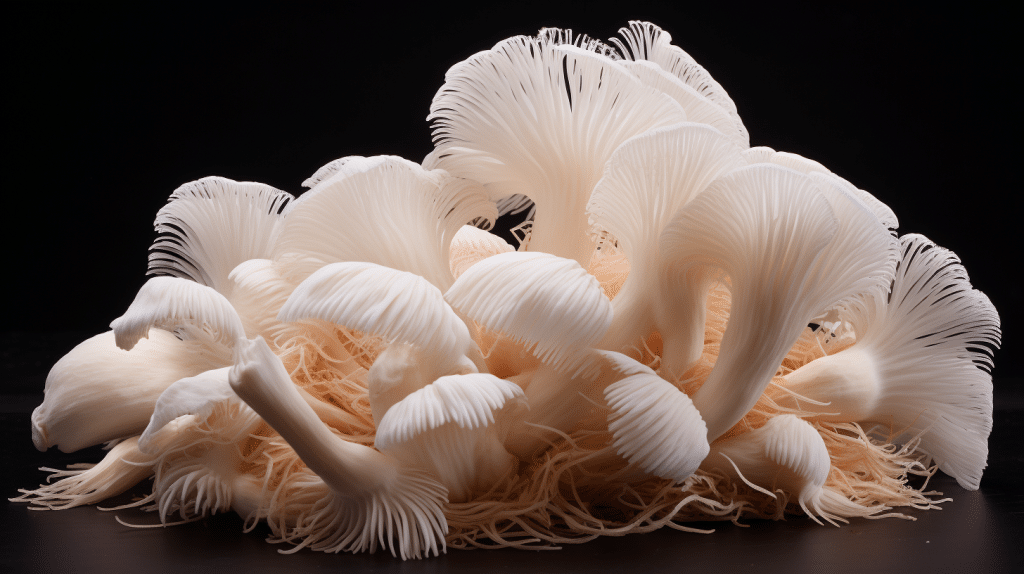
Turkey Tail mushrooms
Turkey Tail mushrooms (Trametes versicolor), so named for their striking, multicolored fan shape that resembles a turkey’s tail, are well-regarded for their medicinal properties. These mushrooms have been used in traditional medicine across various cultures, especially in Asia, for their immune-boosting effects. Let’s examine the benefits and considerations associated with Turkey Tail mushrooms.
Pros:
- Turkey Tail mushrooms are rich in polysaccharopeptides, including PSK and PSP, which are known to boost the immune system and may enhance the body’s ability to fight off infections and cancer;
- Research has shown that Turkey Tail can be a valuable adjunct therapy in cancer treatment, helping to enhance the efficacy of chemotherapy and radiation therapy while reducing side effects;
- They contain prebiotics, which help to nourish and support a healthy gut microbiome, potentially improving digestion and overall gut health;
- Turkey Tail mushrooms are high in antioxidants, which combat oxidative stress and may reduce the risk of chronic diseases.
Cons:
- Some individuals may experience mild digestive upset, such as gas or bloating, particularly when they first start taking Turkey Tail supplements;
- There is always a risk of allergic reactions, which can manifest as skin irritation or respiratory issues in sensitive individuals;
- As with many supplements, Turkey Tail mushrooms could interact with certain medications. It’s essential to consult with a healthcare provider, especially for those undergoing treatment for cancer or other serious conditions.
Turkey Tail mushrooms offer significant health benefits, primarily through immune system support and potential roles in cancer therapy. They also contribute to gut health and possess antioxidant qualities. While generally well-tolerated, it’s important for individuals to be aware of potential digestive discomfort and the importance of consulting healthcare professionals regarding their use alongside medications and treatments.
Little fact. Turkey Tail mushrooms have been studied extensively for their medicinal properties, particularly in Japan and China, where PSK (a substance extracted from Turkey Tail) is officially approved as a cancer treatment adjunct to enhance the immune system.
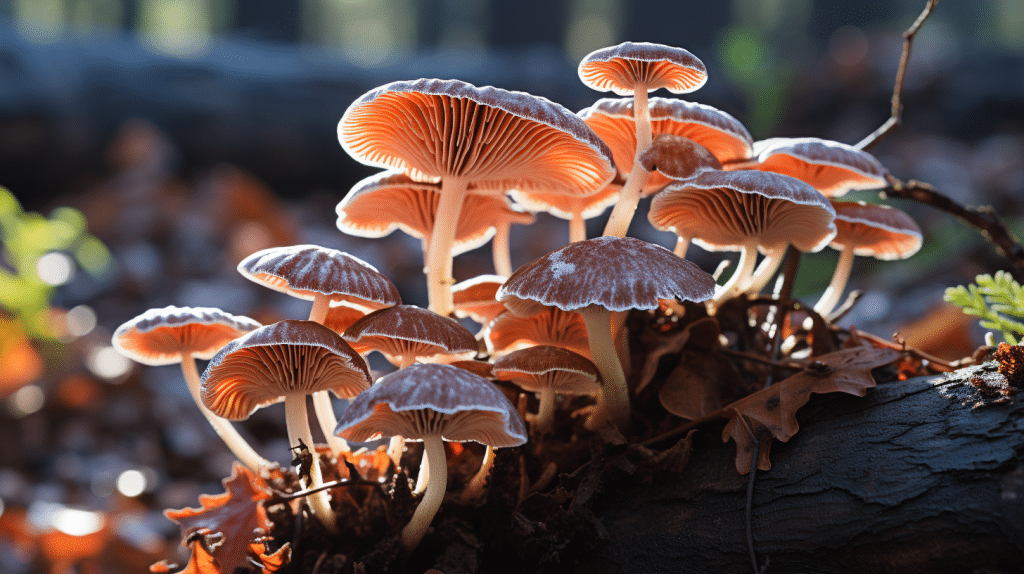
Maitake mushrooms
Maitake mushrooms are another popular type of mushroom supplement. They have been shown to reduce blood sugar levels in people with diabetes, as well as lower cholesterol and triglyceride levels. Maitake mushrooms may also help prevent cancer, protect against heart disease and stroke, promote healthy weight loss and improve digestion.
Pros:
- Maitake mushrooms are renowned for their ability to boost the immune system, owing to their high beta-glucan content, which can enhance the body’s defense against viruses, bacteria, and cancer cells;
- They have been shown to help lower blood sugar levels, making them beneficial for people with diabetes or those at risk of developing diabetes;
- Maitake mushrooms can aid in reducing LDL (“bad”) cholesterol levels, contributing to heart health;
- Preliminary studies suggest that Maitake can slow the growth of certain cancers and enhance the effectiveness of chemotherapy.
Cons:
- For individuals with diabetes or on medications that affect blood sugar levels, Maitake mushrooms might cause hypoglycemia, necessitating monitoring and possible adjustment of medications;
- While rare, some people may experience allergic reactions to Maitake mushrooms, including itching or difficulty breathing;
- Much of the research on Maitake’s health benefits has been conducted in vitro or on animals, with limited clinical trials on humans to fully establish its efficacy and safety profile.
Maitake mushrooms offer several health benefits, particularly in supporting the immune system, managing blood sugar and cholesterol levels, and their potential in cancer care. However, individuals with diabetes or those taking medications for blood sugar management should be cautious and consult with healthcare providers due to Maitake’s hypoglycemic effects. Although promising, further research in humans is needed to fully understand Maitake’s health implications.
Little fact. Maitake mushrooms grow at the base of trees, especially oaks, in dense clusters that can weigh several pounds, making them a spectacular find for foragers. They are highly valued not only for their therapeutic properties but also for their rich, earthy flavor in culinary applications.
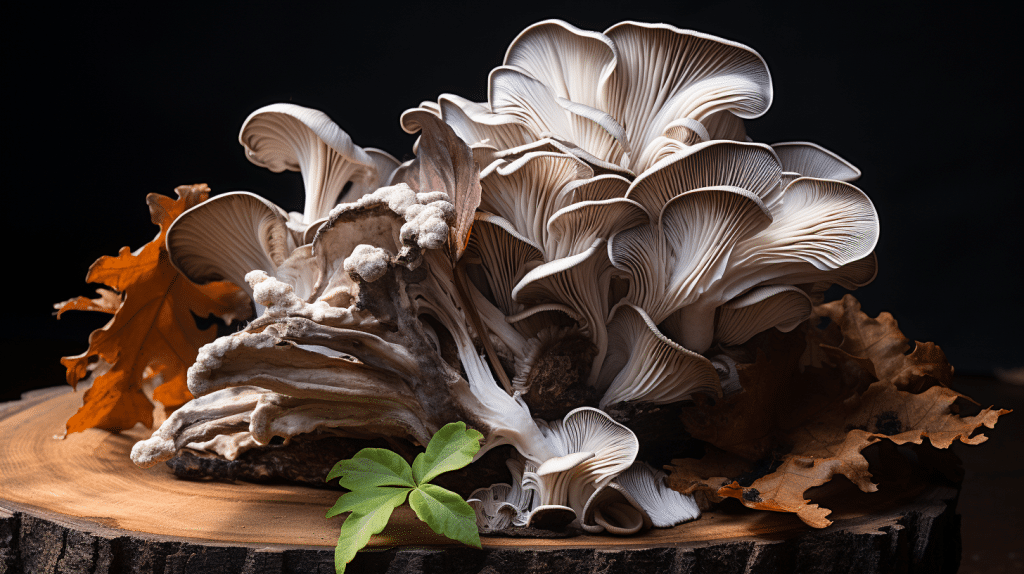
Shiitake Mushrooms
Shiitake mushrooms are another popular type of mushroom supplement. They have been used for centuries in Asia as a remedy for various ailments including colds, flu and other viral infections. Shiitake mushrooms may reduce blood pressure, cholesterol and triglyceride levels, as well as provide relief from symptoms of asthma and allergies.
Pros:
- Shiitake mushrooms are rich in polysaccharides like lentinan, which help boost the immune system and improve its ability to fight off infections and diseases;
- Consuming Shiitake mushrooms can have positive effects on heart health by reducing levels of bad cholesterol (LDL) and increasing levels of good cholesterol (HDL);
- The presence of lentinan in Shiitake mushrooms not only supports the immune system but also has been studied for its potential to inhibit tumor growth;
- Shiitake mushrooms are a good source of B vitamins, vitamin D (especially when sun-exposed), minerals, and dietary fiber, supporting overall health and wellbeing.
Cons:
- In some cases, consuming Shiitake mushrooms can lead to digestive discomfort, including bloating and gas, especially if not cooked properly;
- A rare condition where consuming or handling Shiitake mushrooms can cause a skin rash, known as “Shiitake dermatitis,” due to a reaction to certain compounds in the mushroom;
- As with many fungi, there is a potential for allergic reactions, which could manifest as skin irritation, itching, or respiratory issues in sensitive individuals.
Shiitake mushrooms are highly valued for their distinctive taste and health benefits, including immune system support, heart health, anticancer properties, and nutritional value. While they are generally safe and beneficial to include in the diet, it’s important to be aware of potential digestive discomfort and allergic reactions. Cooking Shiitake mushrooms thoroughly can help minimize some of these concerns.
Little fact. Shiitake mushrooms are traditionally grown on decaying wood of deciduous trees, particularly shii trees, from which they get their name. Today, they are widely cultivated on substrates that replicate these natural conditions, making them accessible worldwide.
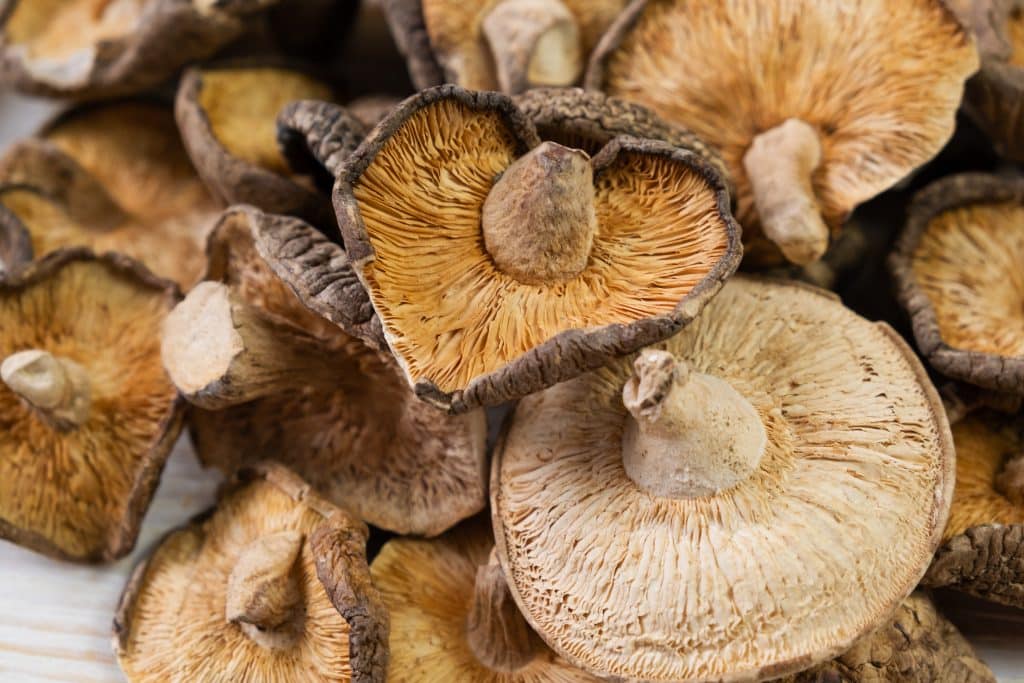
Cordyceps mushrooms
Cordyceps mushrooms are a type of mushroom supplement that is believed to boost energy levels, reduce fatigue and improve athletic performance. They may also help protect against cancer and heart disease by lowering blood pressure and cholesterol levels in the body. Cordyceps mushrooms may also promote healthy weight loss and improve digestion.
Pros:
- Cordyceps are believed to increase the body’s production of ATP (adenosine triphosphate), which is essential for delivering energy to the muscles, potentially improving stamina and endurance;
- The antioxidants in Cordyceps may help reduce aging signs by neutralizing free radicals, contributing to improved skin health and vitality;
- Cordyceps can help boost the immune system by stimulating cells and specific chemicals in the immune system, making your body more capable of fighting infections and diseases;
- Some research suggests that Cordyceps may have a beneficial effect on heart health, including lowering cholesterol levels and potentially offering protection against heart disease.
Cons:
- Some individuals might experience mild side effects, including gastrointestinal discomfort, nausea, or diarrhea when taking Cordyceps supplements;
- Cordyceps could potentially interact with certain medications, such as blood thinners or drugs affecting the immune system, so it’s essential to consult with a healthcare provider before starting them;
- While there are promising studies on the benefits of Cordyceps, much of the research has been conducted in animals or in vitro, necessitating more comprehensive human studies to fully understand their effects.
Cordyceps mushrooms offer a range of potential health benefits, particularly in enhancing athletic performance, supporting immune function, and offering anti-aging properties. However, as with any supplement, it’s important to be cautious of possible side effects and interactions with medications. Consulting a healthcare professional before incorporating Cordyceps into your regimen is advisable.
Little fact. The traditional harvesting of wild Cordyceps sinensis in the Himalayas is a labor-intensive process that contributes to its high cost. Cultivated Cordyceps, such as Cordyceps militaris, provide a more accessible and sustainable alternative with similar health benefits.
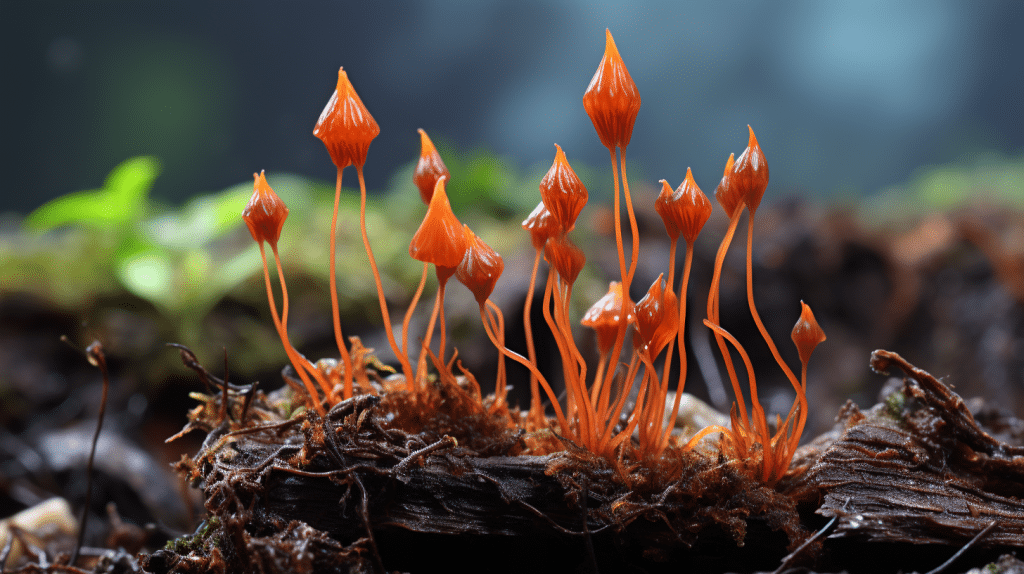
Chaga Mushrooms
Chaga mushrooms are a type of mushroom supplement that is believed to have anti-inflammatory properties. They may help reduce inflammation in the body, which can lead to pain relief from conditions such as arthritis and osteoarthritis. Chaga mushrooms may also promote healthy weight loss by increasing energy levels and preventing the storage of excess fat.
Pros:
- Chaga mushrooms are loaded with antioxidants, which can help reduce oxidative stress and inflammation in the body, potentially lowering the risk of chronic diseases;
- Chaga can help boost the immune system by stimulating white blood cells, which are essential for fighting off harmful bacteria or viruses;
- Some studies suggest that Chaga mushrooms may slow the growth of certain cancer cells due to their high content of antioxidants and other compounds;
- Chaga is thought to help lower blood sugar and cholesterol levels, benefiting overall cardiovascular and digestive health.
Cons:
- Due to its high oxalate content, excessive consumption of Chaga could potentially harm the kidneys over time;
- Chaga may interact with anticoagulant and diabetic medications, affecting their efficacy. It’s important for individuals on such medications to consult with a healthcare provider before using Chaga;
- While promising, much of the research on Chaga’s health benefits is preliminary, with most studies conducted in vitro or on animals. More clinical trials are needed to confirm its effects on humans.
Chaga mushrooms offer a unique array of health benefits, notably their potent antioxidant properties and support for the immune system and overall health. However, due to potential health risks and interactions with medications, it’s advisable to use Chaga with caution and under the guidance of a healthcare professional, especially for those with existing health conditions or those taking medication.
Little fact. Chaga has been traditionally consumed as a tea in parts of Russia and Northern Europe, a practice that dates back centuries. This method of consumption allows for the extraction of its bioactive compounds, offering a way to enjoy its potential health benefits.
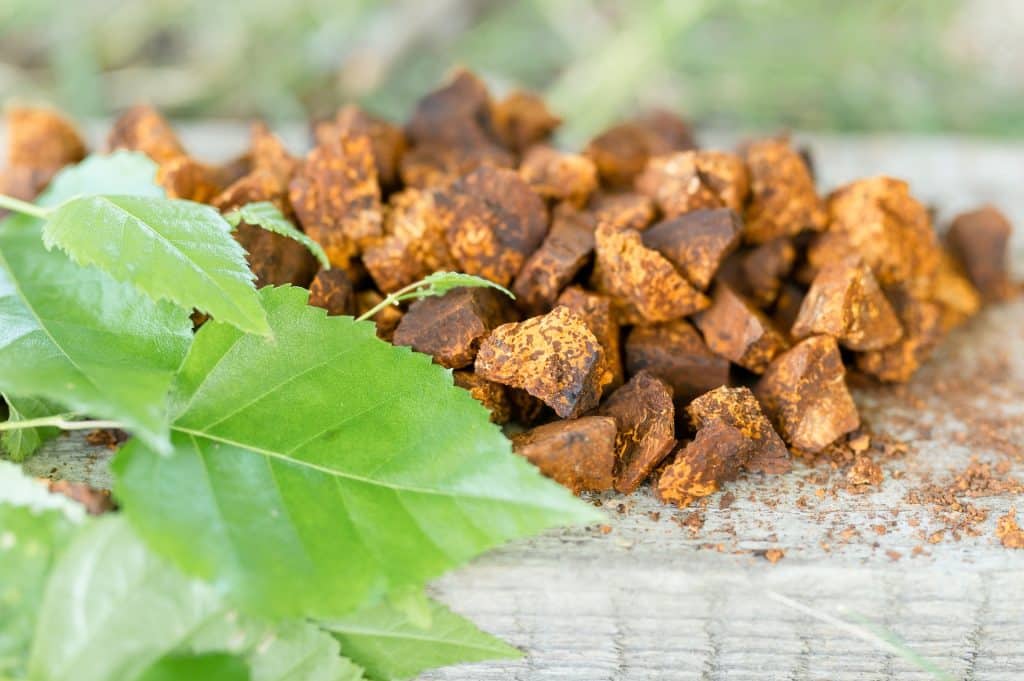
When to Avoid Mushroom Supplements
When considering the integration of mushroom supplements into your health and wellness regimen, it’s essential to recognize situations where these supplements might not be suitable or should be used with caution.
Health Conditions
Mushroom enthusiasts with specific health conditions need to exercise caution. For those pregnant or breastfeeding, it’s crucial to consult healthcare providers before considering mushroom supplements. The impact of these supplements on pregnancy and lactation is not fully understood, making professional guidance essential. For individuals allergic to mushrooms, avoiding these supplements is non-negotiable. Even minor components in the supplement could trigger severe allergic reactions. Safety comes first, and steering clear of any mushroom-based product is advised for these people.
Medical Advice
Seeking medical advice becomes paramount for anyone undergoing treatment for serious health conditions. Mushroom supplements can interact with medications in unpredictable ways. Before adding them to one’s regimen, a conversation with a healthcare provider can prevent potential adverse effects. It’s important for patients not only to disclose their interest in mushroom supplements but also to discuss their current medication list thoroughly with their doctor. This ensures that all aspects of their health are considered before introducing new elements into their treatment plan.
The Final Word
When contemplating which mushroom supplements to incorporate into your wellness regimen, it becomes evident that each type provides its own distinct advantages. These benefits span from bolstering the immune system and possessing anti-cancer properties to enhancing cognitive function and improving athletic performance. However, it’s important to approach mushroom supplementation with mindfulness!
Reference:
Learn More:







